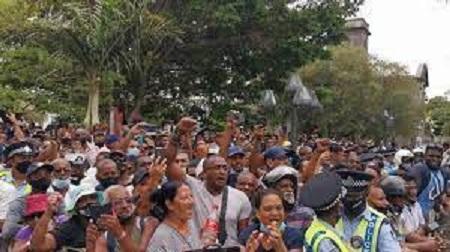Africa-Press – Mauritius. The Project Citizen ? Mauritius steps up to a higher level. For its second national edition, the ministry of Education has geared things up. Last year, the project was meant only for State colleges. This time, the authorities would like to include private colleges and Rodrigues also. A series of workshops should start this week.
The major aim is to give a national dimension to this project, which even caught the eye of the Prime minister, Navin Ramgoolam, who recently underlined its viability in the context of strengthening national unity and solidarity among citizens.
The target is Form IV pupils. Through Project Citizen-Mauritius, the ministry wants to make them feel more concerned about their direct environment and more involved with the society.
Why Form IV students? ?Because they have acquired a certain maturity and they don?t have to take part in major exams?, explains an official of the ministry.
Initiated in Mauritius three years ago by Amode Taher, director of Zone 4 at the ministry of Education, who had discovered it during a trip in the US, this project not only makes students aware but it provokes their active participation in real life.
In America, this project has had a major positive impact on the school population. In 2005, not less then 3 million kids coming from 50 different states participated.
After obtaining the green light from the minister of Education, Dharam Gokhool, a small scale pilot project was launched in 2006 involving colleges from Vacoas-Phoenix, Quatre-Bornes and the West.
This trial exercise proved a success. Last year it was extended to State colleges. Project Citizen takes an innovative approach to address public policy issues and challenges facing the community, generating ideas to meet those challenges.
Created by the Centre for Civic Education in the US, the program helps participants learn how to monitor and influence public policy. In the process, the students develop support for democratic values and principles, tolerance and feelings of political efficiency.
By focusing on real-life problems and concerns, students learn practical ways to participate actively and responsibly in State and local government. “Our students have a great opportunity to interact with the community on issues that affects it.
They talk to adults, expose their problems, question them and propose solutions. ? More then working on a simple presentation, students have to go into real life: interview officials, analyse closely the problem they choose to tackle, do some research and have regular brain-storming sessions.
They also have to submit an action plan where they propose ways to solve the problem they have identified. ?Through this project, our students have a great opportunity to interact live with the community on issues that affects it.
They go on the field, talk to adults, expose their problems, question them, propose solutions. Our students are already learning about public policy making in the field, and can indeed play a decisive role in influencing policy makers.
Such projects provide opportunities to engage in both horizontal citizenship (relating with neighbours and the public) as well as vertical citizenship (relating with government and institutions); bring the citizens and the government closer and challenge governments to listen to our youth?, stated the minister of Education Dharam Gokhool last year at the opening ceremony of the first national finals of Project Citizen ? Mauritius at Sir Abdool Raman Osman SSS, at Phoenix.
Project Citizen Mauritius is as a matter of fact more than a civic education programme. It already prepares youngsters for the adult world where they will have to shoulder responsibilities as mature citizens.
For More News And Analysis About Mauritius Follow Africa-Press







